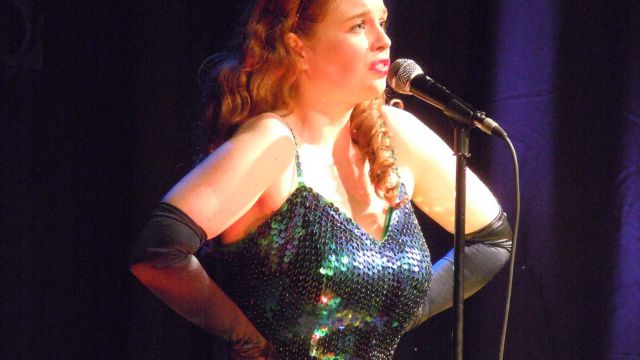The Rise and Fall of Little Voice
“Voice” is the operative word if any company is thinking of mounting this play, because it requires a very special actor. Firstly she has to be able to sing! More importantly she has to be able to imitate the voices of some of the most talented divas of popular music. And the imitation has to be better than good, or the impact of the play is completely lost. Then she has to be able to play a convincing, shy agoraphobic who spends her days shut in an attic listening to her father’s old records.
Luckily for director Christine Firkin, Debbie Neilson can do both!
Eyes lowered, body hunched, speaking in faltering monosyllables, she is almost diminished as Elvie, but when she sings she begins to grow in stature and eventually she soars as she finds the voices of all her vinyl heroines: the throaty notes of Judy Garland, the husky sexiness of Marilyn Monroe, the range of Shirley Bassey, the rocking confidence of Lulu’s “Shout”! And, ultimately, finds her own powerful voice.
It is fortunate that a ‘glitch’ in the New Theatre’s 2014 program gave Neilson the chance to reprise this role for a wider audience.
The play itself is set in a tawdry council flat in London plagued by faulty wiring, though not quite as ‘make-shift’ as this set suggests. Doors that don’t fit doorways and cupboards that tip when someone leans on them are not the usual set one expects on the New Theatre stage. The lighting also disappoints, especially the line of blues that, for some strange reason, point straight into the eyes of the audience.

The characters that people the set are similarly tawdry.
Mari Hoff, Little Voice’s mother, is a self-indulgent lush, clinging to her fading youth. Wendy Morton plays this role with courage and some flair that, unfortunately, goes a little too far over the top at times. She struts and gestures a bit too much and her drunken faltering is a tad overdone. Nevertheless, she does find some pathos in Mari’s desperate need and the despicable wantonness in the way she treats her daughter and her luckless, overweight neighbour, Sadie.
Michelle Bellamy is engaging as Sadie. She takes Mari’s orders and personal insults calmly, but the underlying strength in her portrayal reaches the audience through a mincing walk and guarded facial expressions.
Nick Bolton and Kevin Weir play failed casting agent Ray Say and the flashy Mr Boo, MC of the local club. Both are sleazy characters who see Little Voice only as money earner. Luke Reeves plays Billy, the telephone boy who eventually wins her trust and love.
The depressing feeling of failure and greed that underpins this play is never quite taken away by the hope that Little Voice may escape. But Debbie Neilson’s voice is some compensation.
Carol Wimmer
Photographer: Geoff Sirmai
Subscribe to our E-Newsletter, buy our latest print edition or find a Performing Arts book at Book Nook.

